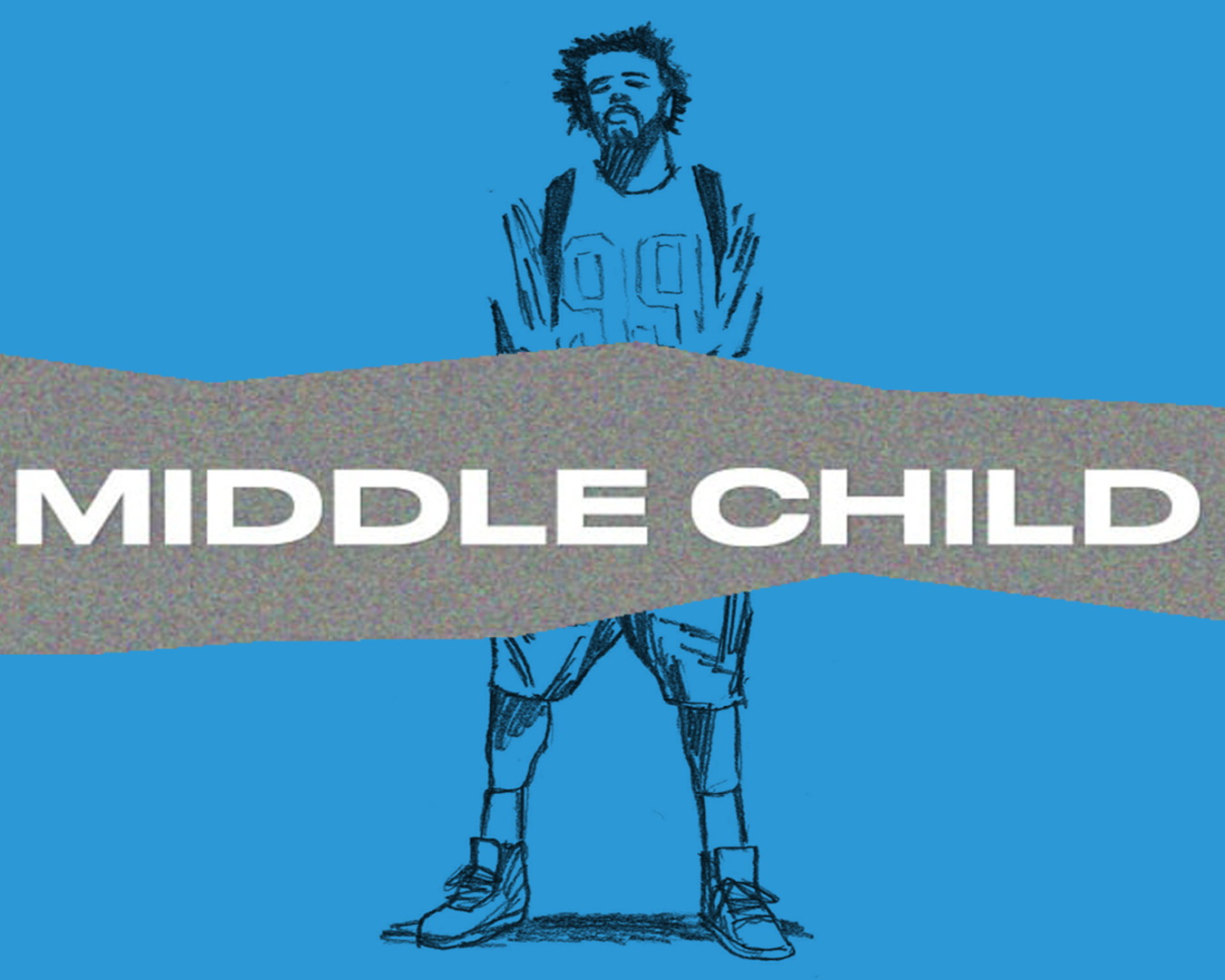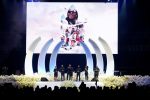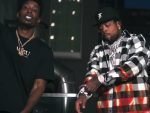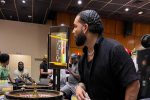This month marks 10 years since J. Cole spent several days camped outside of Jay-Z’s office building in hopes of running into the legend and persuading him to listen to a demo. Cole has made tremendous progress since then, becoming the first artist signed by Jay-Z’s Roc Nation label, going triple platinum with no features, creating his own record company, Dreamville, and, ultimately, gaining a reputation as a master musician who will go down in history as one of the greatest rappers of all time.
Last month, five days before the beloved North Carolina native turned 34, he put the rap game on notice with the much-anticipated single, “Middle Child.” On the surface, it’s a catchy song describing how Cole feels caught in the middle of two very opposing generations, but as we delve into the deeper meanings of his lyrics, the lessons Cole wishes for listeners to hear become strikingly evident.
No one wins without the help of their teammates.
Cole, a man known for his many modest ways, begins with the intro “You good, T-Minus?” crediting the hands that helped him pave the way toward his highest charting track to date. As a result, Producer T-Minus receives the recognition he deserves for helping Cole bring this song to life from start to finish, and in a single recording session, to say the least.
The pair has become quite the dynamic duo following their work on “Kevin’s Heart.” Cole demonstrates his selflessness once again by plugging T-Minus and admitting to the world that his teammates constantly provide him with the rebounds and assists that lead to victory.
In a similar regard, Cole mentions LeBron James in the line “Just like LeBron, get my n*ggas more chips,” creating a metaphor that refers to when James teamed up with Dwayne Wade and Chris Bosh in order to win his first NBA title in 2010. Appropriately, the song has already appeared on commercials for the basketball franchise, and Cole is set to headline this year’s All-Star Game taking place in his home state this weekend.
Money can’t fix everything.
For someone who is already worth over $30 million, Cole has an insightfully mature outlook on money and his own spending habits. Singing “I hope you know money won’t erase the pain,” and “money in your palm don’t make you real,” Cole identifies a theme that rarely gets discussed openly by celebrities in the media.
Instead of frequently flaunting his riches, Cole chooses to remain humble, singing, “My sneakers is dirty, but that’s how I like it” and “What good is the bread if my n—- is broke?/ What good is first class if my n—– can’t sit?” remembering that there are far more important aspects to life than material belongings. Cole stresses that while it’s often epitomized as the solution to all of the questions in the universe, at the end of the day, amassing wealth rarely brings fulfillment.
Stay focused on your own morals.
Throughout the years, Cole has become infamous for calling out the rap industry, big-budget promotional campaigns, social media and the press. The rant he offers in “Middle Child” serves a similar purpose, as Cole declares that he will always be dedicated to elevating those around him rather than tearing them down for his own success. This is clearly communicated with the line about Drake, Cole’s peer who has experienced a parallel career to his and is often dubbed one of his biggest competitors.
Regardless of the industry’s attempt to get the artists to feud based merely on sales, the two remain close friends and were recently seen on Drake’s Snapchat story hanging out in LA. Declining to comply with the demands of the rap game, Cole persists with the notion that he will not partake in any unnecessary drama.
“This watch came from Drizzy, he gave me a gift / Back when the rap game was prayin’ I’d diss / They act like 2 legends cannot coexist / But I’d never beef with a n—- for nothin’ / If I smoke a rapper, it’s gon’ be legit,” raps Cole.
Later, Cole even comes to Drake’s defense when he drops a handful of bars that critics have claimed are directed at Kanye West, with whom Drizzy has been in an on-again, off-again cold war. “It won’t be for clout, it won’t be for fame / It won’t be ‘cause my s— ain’t sellin’ the same,” raps Cole. “It won’t be to sell you my latest lil’ sneakers / It won’t be ‘cause some n—- slid in my lane.” Cole, however, only stays on this page for a second, as he has bigger and more crucial issues to address.
The importance of rising above preconceived assumptions.
Cole gets into some heavier topics regarding drug use and his wish for the black community to perceive itself as worthy of greatness instead of destined for a life spent behind bars. Known as being a deep lyricist from the start of his career, Cole reveals in “Middle Child” that his state of mind has only gotten stronger over time.
In criticism of the ways that contemporary hip hop tends to promote drug use, Cole writes, “I do not snort powder, I might take a sip / I might hit the blunt, but I’m liable to trip / I ain’t poppin’ no pills, but you do as you wish,” letting listeners know that he doesn’t agree with the notion that drug use is a cool concept.
Following the loss of his dear friend Mac Miller at the hands of an overdose, Cole sent a tweet requesting that anyone going through something reach out to him when they “feel some type of way.” Showing his care and concern about the dangers of substance abuse, Cole urges society to become fully aware of the consequences of their actions.
Cole gives another shout out, this time to Kodak Black, who was recently released from prison and is currently awaiting trial for a separate sexual assault charge. The verse speaks for itself, as Cole attempts to hit home with the illustrations he paints in listeners’ minds about seeing a better future for the black community.
“Had a long talk with the young n—- Kodak,” Cole raps. “Reminded me of young n—-s from ‘Ville / Straight out of projects, no fakin’, just honest / I wish that he had more guidance, for real / Too many n—-s in cycle of jail/ Spending their birthdays inside of a cell/ We coming from a long bloodline of trauma/ We raised by our mamas, Lord we gotta heal.”
Don’t forget where you came from, or where you’re going.
Cole is aware that he owes a lot of his current expertise to the legends that came before him who taught him how to produce timeless music. He shows gratitude “To the OGs” by identifying them as the root of his success, thanking them with the lines “I copied your cadence, I mirrored your style / I studied the greats, I’m the greatest right now.” Although he appreciates the wisdom of his elders, Cole refuses to stay stuck in the past. “Everything grows, it’s destined to change,” he raps, looking toward the future with hopeful eyes for what’s yet to come.
According to Cole, fans can expect more of the same heat we heard in “Middle Child” from him and the rest of the Dreamville compilation team for the rest of the year. Cole’s confidence in whatever he’s about to drop is palpable, shown clearly with the verse “F— if you feel me, you ain’t got a choice / Now I ain’t do no promo, still made all that noise / This s— gon’ be different, I set my intentions / I promise to slap all that hate out your voice.”
Once again, J. Cole proves that he’s motivated to make a positive change in the black community, and around the world.
















